Diary of Arthur Seaforth Blackburn, April 1942 - November 1944, Part 26 of 26
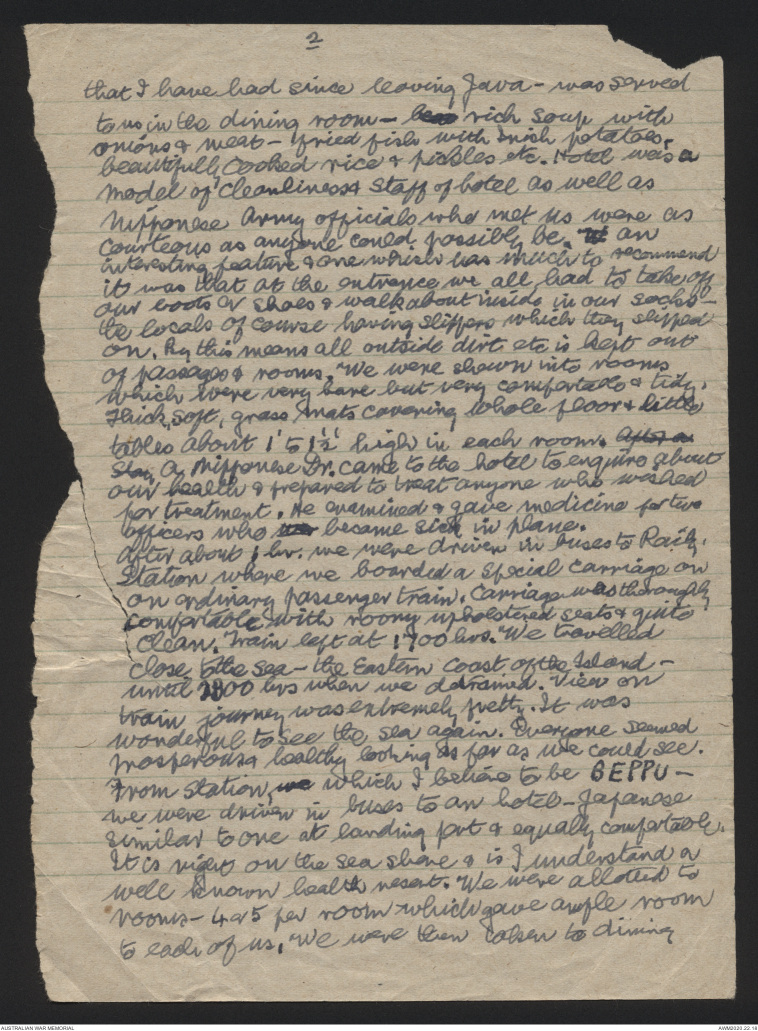
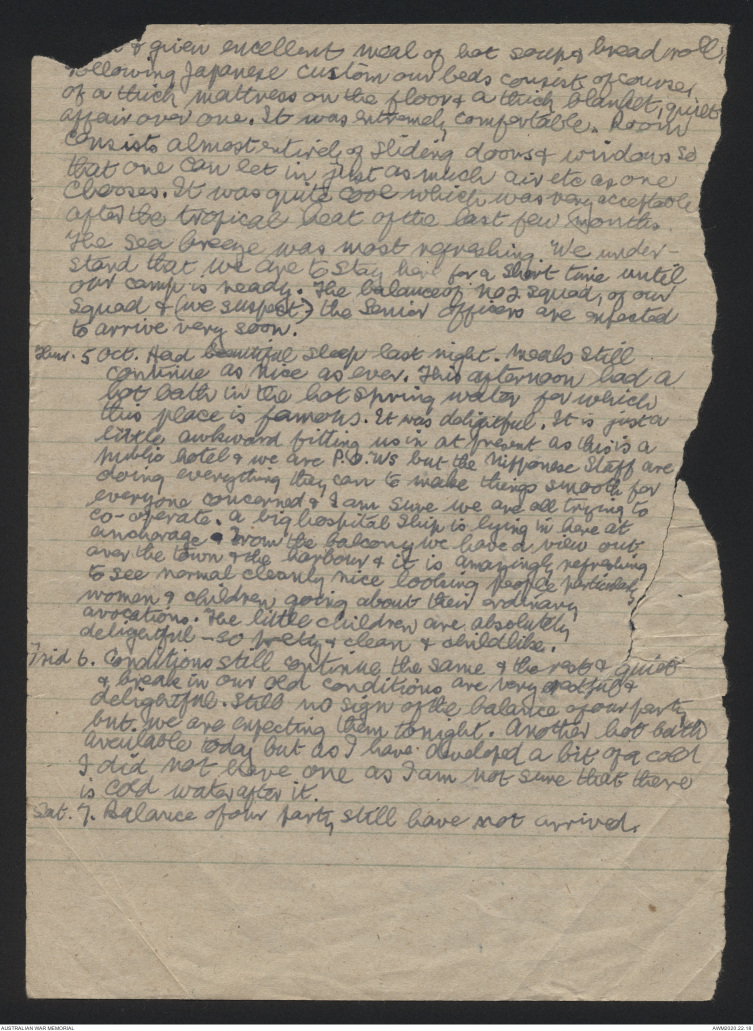
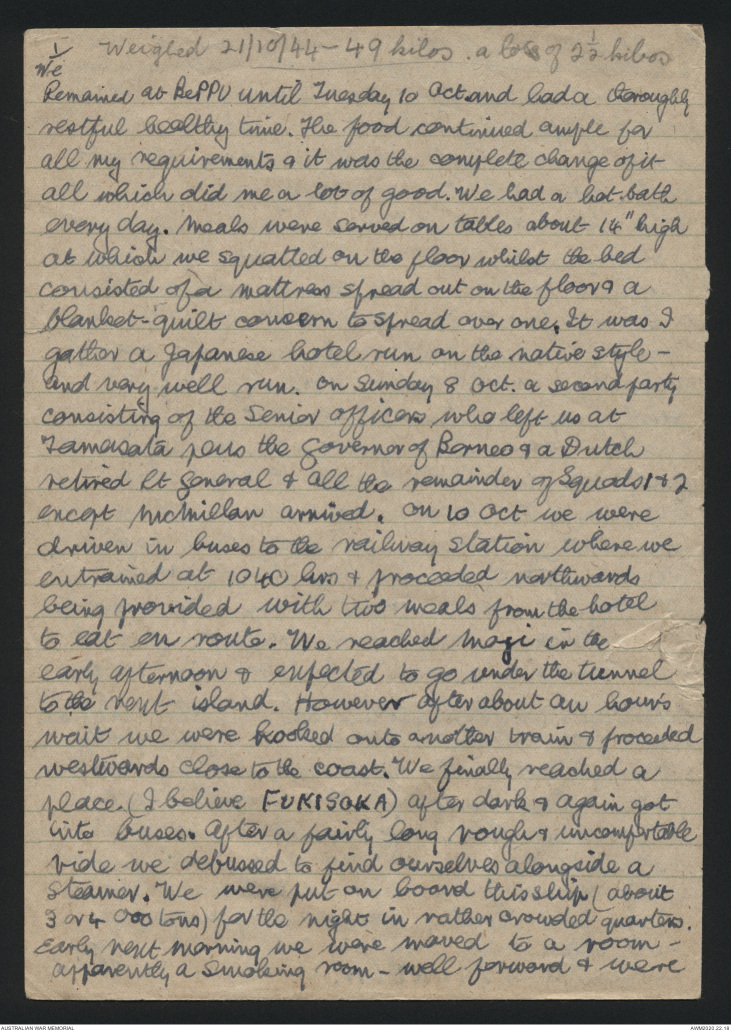
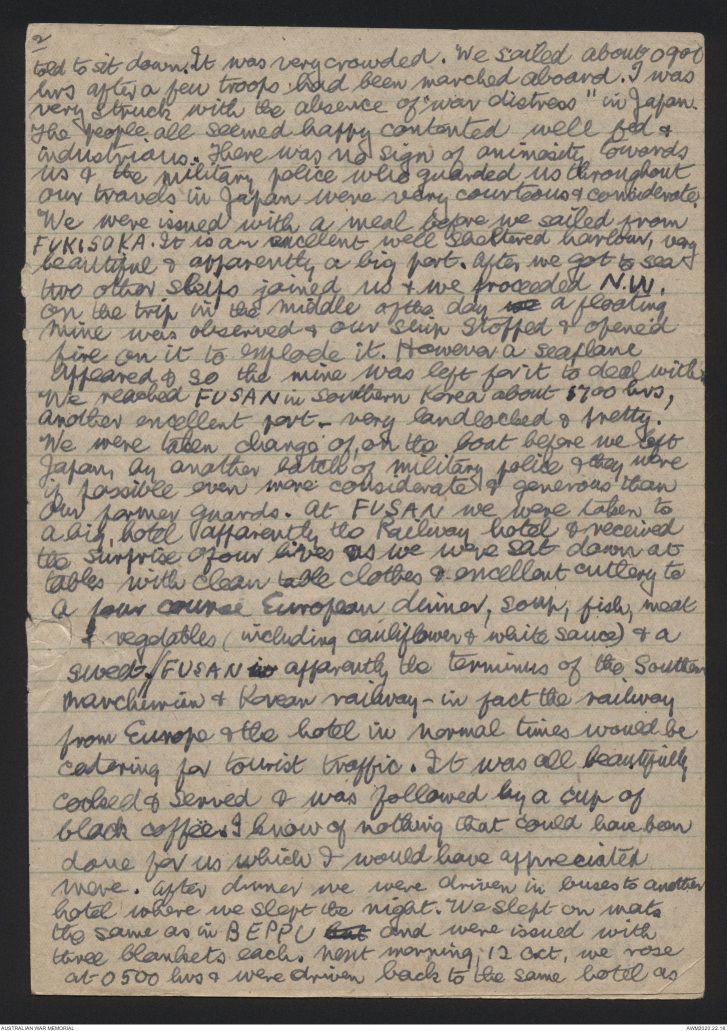
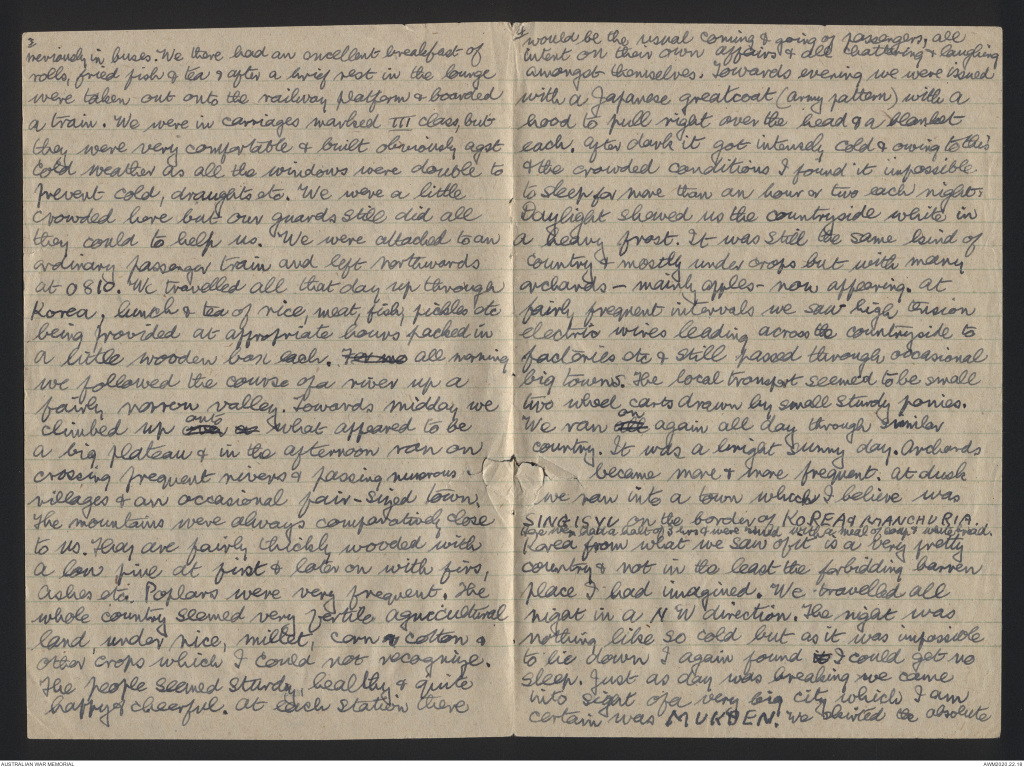
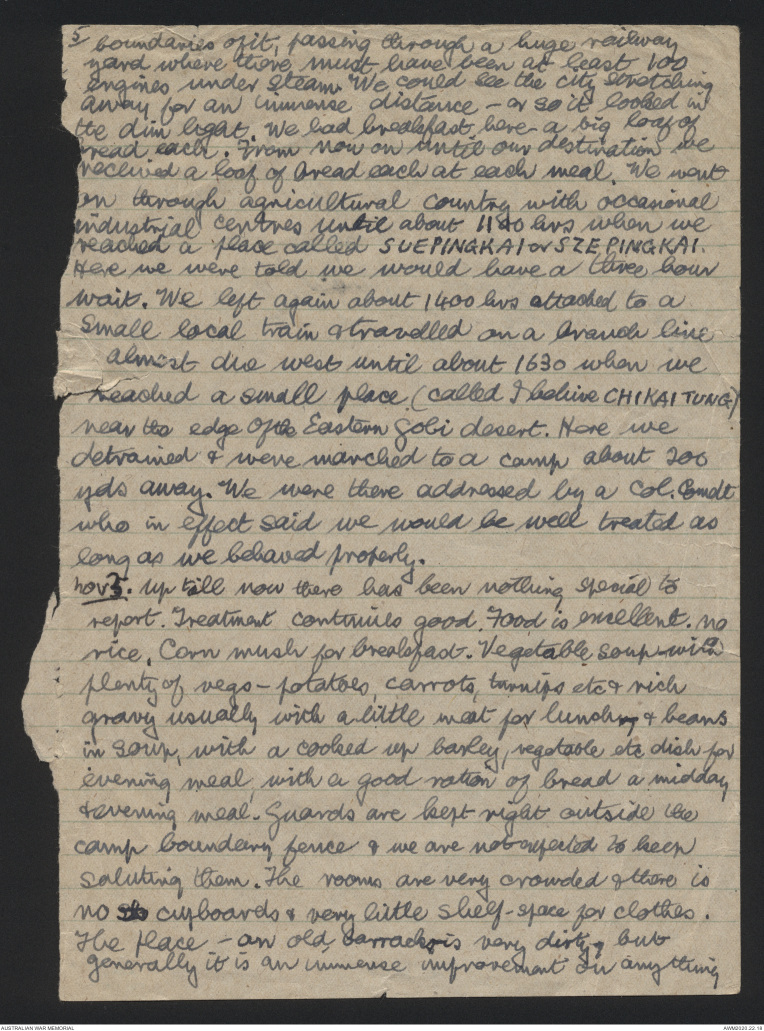
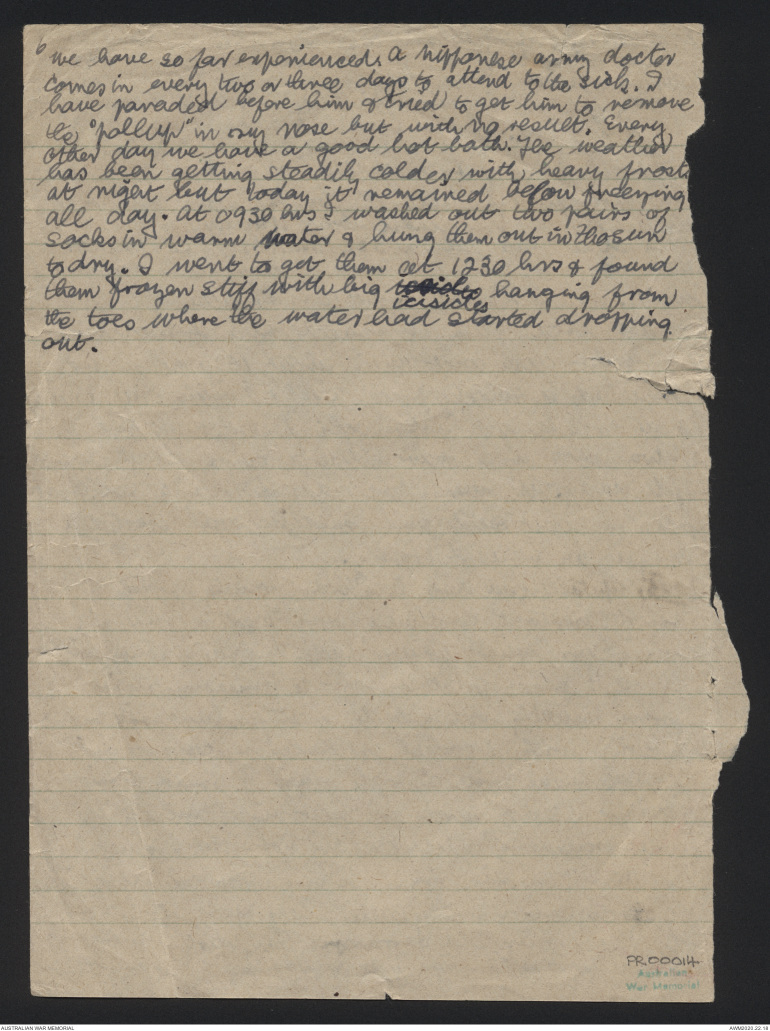
2
that I have had since leaving Java - was served
to us in the dining room - bean rich soup with
onions & meat - fried fish with Irish potatoes,
beautifully cooked rice & pickles etc. Hotel was a
model of cleanliness & staff of hotel as well as
Nipponese Army officials who met us were as
courteous as anyone could possibly be. W An
interesting feature & one which has much to recommend
it was that at the entrance we all had to take off
our boots or shoes & walk about inside in our socks -
the locals of course having slippers which they slipped
on. By this means all outside dirt etc is kept out
of passages & rooms. We were shown into rooms
which were very bare but very comfortable & tidy,
Thick, soft, grass mats covering whole floor & little
tables about 1' to 1½' high in each room. After a Stay, A Nipponese Dr. came to the hotel to enquire about
our health & prepared to treat anyone who wished
for treatment. He examined and gave medicine for two
officers who wer became sick in plane.
After about 1 hr. we were driven in buses to Raily,
Station where we boarded a special carriage on
an ordinary passenger train. Carriage was thoroughly
comfortable with roomy upholstered seats & quite
clean. Train left at 1700 hrs. We travelled
close to the sea - the Eastern Coast of the Island -
until 2300 hrs when we detrained. View on
train journey was extremely pretty. It was
wonderful to see the sea again. Everyone seemed
prosperous & healthy looking as far as we could see.
From Station, we which I believe to be BEPPU -
we were driven in buses to an hotel - Japanese
similar to one at landing port and equally comfortable.
It is right on the sea shore & is I understand a
well known health resort. We were allotted to
rooms - 4 or 5 per room which gave ample room
to each of us. We were then taken to dining
& given excellent meal of hot soup & bread rolls,
Following Japanese custom our beds consists of courser
of a thick mattress on the floor & a thick blanket, quilt
affair over one. It was extremely comfortable. Room
consists almost entirely of sliding doors & windows so
that one can let in just as much air etc as one
chooses. It was quite cool which was very acceptable
after the tropical heat of the last few months.
The sea breeze was most refreshing. Weunderstand
that we are to stay here for a short time until
our camp is ready. The balance of no 2 squad, of our
squad & (we suspect) the Senior officers are expected
to arrive very soon.
Thurs. 5 Oct. Had beautiful sleep last night. Meals still
continue as nice as ever. This afternoon had a
hot bath in the hot spring water for which
this place is famous. It was delightful. It is just a
little awkward fitting us in at present as this is a
public hotel & we are P.O.Ws but the Nipponese staff are
doing everything they can to make things smooth for
everyone concerned & I am sure we are all trying to
co-operate. A big hospital ship is lying in here at
anchorage. From the balcony we have a view out
over the town & the harbour & it is amazingly refreshing
to see normal clearly nice looking people particularly
women & children going about their ordinary
avocations. The little children are absolutely
delightful - so pretty & clean & childlike.
Frid 6. Conditions still continue the same & the rest & quiet
& break in our old conditions are very restful &
delightful. Still no sign of the balance of our party
but we are expecting them tonight. Another hot bath
available today but as I have developed a bit of a cold
I did not have one as I am not sure that there
is cold water after it.
Sat.7. Balance of our party still have not arrived.
1 Weighed 21/10/44 - 49 kilos. a loss of 2 1/2 kilos
We
Remained at BePPU until Tuesday 10 Oct and had a thoroughly
restful healthy time. The food continued ample for
all my requirements & it was the complete change of it
all which did me a lot of good. We had a hot bath
every day. Meals were served on tables about 14" high
at which we squatted on the floor whilst the bed
consisted of a mattress spread out on the floor & a
blanket-quilt concern to spread over one. It was I
gather a Japanese hotel run on the native style -
and very well run. On Sunday 8 Oct. a second party
consisting of the Senior Officers who left us at
Tamasata plus the Governor of Borneo & a Dutch
retired Lt General & all the remainder of Squads 1 & 2
except McMillan arrived. On 10 Oct we were
driven in buses to the railway station where we
entrained at 1040 hrs & proceeded northwards
being provided with two meals from the hotel
to eat en route. We reached Maji in the
early afternoon & expected to go under the tunnel
to the next island. However after about an hour's
wait we were hooked onto another train & proceeded
westwards close to the coast. We finally reached a
place (I believe FUKISOKA) after dark & again got
into buses. After a fairly long rough & uncomfortable
ride we debussed to find ourselves alongside a
steamer. We were put on board this ship (about
3 or 4000 tons) for the night in rather crowded quarters.
Early next morning we were moved to a room -
apparently a smoking room - well forward & were
2
told to sit down. It was very crowded. We sailed about 0900
hrs after a few troops had been marched aboard. I was
very struck with the absence of "war distress" in Japan.
The people all seemed happy contented well fed &
industrious. There was no sign of animosity towards
us & the military police who guided us throughout
our travels in Japan were very courteous & considerate.
We were issued with a meal before we sailed from
FUKISOKA. It is an excellent well sheltered harbour, very
beautiful & apparently a big port. After we got to sea
two other ships joined us & we proceeded N.W.
On the trip in the middle of the day we a floating
mine was observed & our ship stopped & opened
fire on it to explode it. However a seaplane
appeared & so the mine was left for it to deal with.
We reached FUSAN in southern Korea about 1700 hrs,
another excellent port - very landlocked & pretty.
We were taken charge of, on the boat before we left
Japan by another batch of military police & they were
if possible even more considerate & generous than
our former guards. At FUSAN we were taken to
a big hotel apparently the Railway hotel & received
the surprise of our lives as we were sat down at
tables with clean table cloths & excellent cutlery to
a four course European dinner, soup, fish, meat
& vegetables (including cauliflower & white sauce) & a
sweet. // FUSAN is apparently the terminus of the Southern
Manchurian & Korean railway - in fact the railway
from Europe & the hotel in normal times would be
catering for tourist traffic. It was all beautifully
cooked & served & was followed by a cup of
black coffee. I know of nothing that could have been
done for us which I would have appreciated
more. After dinner we were driven in buses to another
hotel where we slept the night. We slept on mats
the same as in BEPPU but and were issued with
three blankets each. Next morning 12 Oct, we rose
at 0500 hrs & were driven back to the same hotel as
3
previously in buses. We there had an excellent breakfast of
rolls, fried fish & tea & after a brief rest in the lounge
were taken out onto the railway platform & boarded
a train. We were in carriages marked III class, but
they were very comfortable & built obviously agst
cold weather as all the windows were double to
prevent cold, draughts etc. We were a little
crowded here but our guards still did all
they could to help us. We were attached to an
ordinary passenger train and left northwards
at 0810. We travelled all that day up through
Korea, lunch & tea of rice, meat, fish, pickles etc
being provided at appropriate hours packed in
a little wooden box each. For no All morning
we followed the course of a river up a
fairly narrow valley. Towards midday we
climbed up over a onto what appeared to be
a big plateau & in the afternoon ran on
crossing frequent rivers & passing numerous
villages & an occasional fair-sized town.
The mountains were always comparatively close
to us. They are fairly thickly wooded with
a low pine at first & later on with firs,
ashes etc. Poplars were very frequent. The
whole country seemed very fertile agricultural
land, under rice, millet, corn & cotton &
other crops which I could not recognize.
The people seemed sturdy, healthy & quite
happy & cheerful. At each station there
4
would be the usual coming & going of passengers, all
intent on their own affairs & all chattering & laughing
amongst themselves. Towards evening we were issued
with a Japanese greatcoat (army pattern) with a
hood to pull right over the head & a blanket
each. After dark it got intensely cold & owing to this
& the crowded conditions I found it impossible
to sleep for more than an hour or two each night.
Daylight showed us the countryside white in
a heavy frost. It was still the same kind of
country & mostly under crops but with many
orchards - mainly apples - now appearing. At
fairly frequent intervals we saw high tension
electric wires leading across the countryside to
factories etc & still passed through occasional
big towns. The local transport seemed to be small
two wheeled carts drawn by small sturdy ponies.
We ran all on again all day through similar
country. It was a bright sunny day. Orchards
became more & more frequent. At dusk
we ran into a town which I believe was
SINGISYU on the border of KOREA & MANCHURIA.
Here we had a halt of 3 hrs & were issued with a meal of soup & white bread.
Korea from what we saw of it is a very pretty
country & not the least the forbidding barren
place I had imagined. We travelled all
night in a NW direction. The night was
nothing like so cold but as it was impossible
to lie down I again found it I could get no
sleep. Just as day was breaking we came
into sight of a very big city which I am
certain was MUKDEN. We skirted the absolute
5
boundaries of it, passing through a huge railway
yard where there must have been at least 100
engines under steam. We could see the city stretching
away for an immense distance - or so it looked in
the dim light. We had breakfast here - a big loaf of
bread each. From now on until our destination we
received a loaf of bread each at each meal. We went
on through agricultural country with occasional
industrial centres until about 1100 hrs when we
reached a place called SUEPINGKAI or SZEPINGKAI.
Here we were told we would have a three hour
wait. We left again about 1400 hrs attached to a
small local train & travelled on a branch line
almost due west until about 1630 when we
reached a small place (called I believe CHIKAI TUNG)
near the edge of the Eastern Gobi desert. Here we
detrained & were marched to a camp about 200
yds away. We were there addressed by a Col. Comdt
who in effect said we would be well treated as
long as we behaved properly.
Nov 3. Up till now there has been nothing special to
report. Treatment continues good. Food is excellent. no
rice, Corn mush for breakfast. Vegetable soup - with
plenty of vegs - potatoes, carrots, turnips etc & rich
gravy usually with a little meat for lunching & beans
in soup, with a cooked up barley, vegetable etc dish for
evening meal, with a good ration of bread a midday
& evening meal. Guards are kept right outside the
camp boundary fence & we are not expected to keep
saluting them. The rooms are very crowded & there is
no sh cupboards & very little shelf space for clothes.
The place - an old barracks - is very dirty, but
generally it is an immense improvement on anything
6
we have so far experienced. A Nipponese army doctor
comes in every two or three days to attend to the sick. I
have paraded before him & tried to get him to remove
the "pollup" in my nose but with no result. Every
other day we have a good hot bath. The weather
has been getting steadily colder with heavy frost
at night but today it remained below freezing
all day. At 0930 hrs I washed out two pairs of
socks in warm water & hung them out in the sun
to dry. I went to get them at 1230hrs & found
them frozen stiff with big icsicles icisicles hanging from
the toes where the water had started dropping
out.
 Jacqueline Kennedy
Jacqueline KennedyThis transcription item is now locked to you for editing. To release the lock either Save your changes or Cancel.
This lock will be automatically released after 60 minutes of inactivity.